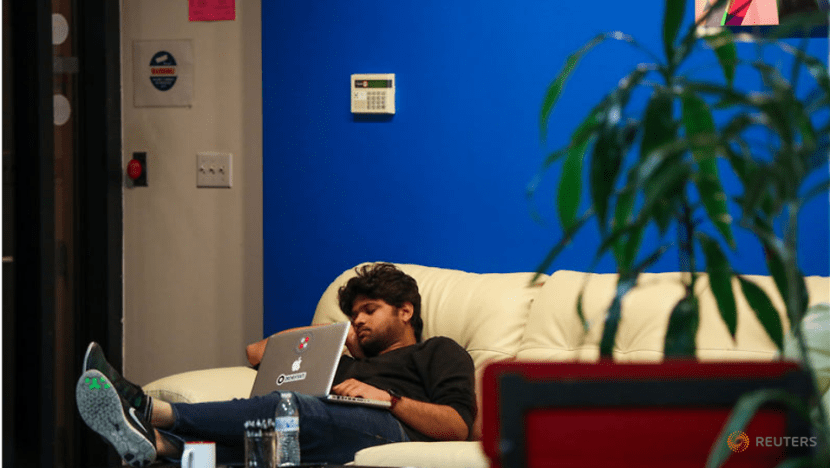commentary Commentary
Commentary: Call me a strawberry millennial, but being passionate doesn’t mean I’m willing to be exploited
Contrary to popular belief, not all younger employees believe a “fun” work environment will necessarily fuel their passion. Some of us just want to be adequately appreciated and compensated for our hunger.

Staying connected is paramount as new ways of working come into play. Photo: Shutterstock
SINGAPORE: When I began my first job bright-eyed and bushy-tailed six years ago, I pinned a postcard with a career platitude to my cubicle: “Find a job you enjoy doing, and you will never have to work a day in your life.”
The infamous Mark Twain quote had seemingly become the North Star for many idealists, including myself, around the time us 90s millennials started entering the workforce.
It implied that passion wasn’t just necessary for career satisfaction, it was a notable achievement in itself. As though landing a job that didn’t compel one to leap out of bed every morning was something to be ashamed about.
Having passion implicitly meant your 9-to-5 was better and cooler than everyone else’s – one of the pinnacles of supposedly having successfully conquered adulthood.
READ: Work in office, from home, or both? Hybrid work has potential and pitfalls, say experts
LISTEN: Returning to the office – can you say no?
In practice, the nebulous term of passion translated into my peers and I aspiring for jobs in unconventional companies that often modelled its ethos and culture after Western tech companies.
These companies boasted values like a flat organisational structure and a workplace culture that reinforced the importance of being a “family”.
For example, a friend who works in a start-up tells me that having worked in more corporate settings, she romanticised the idea of having a “a close-knit relationship with co-workers” that made workplace relationships akin to family bonds. This made her work harder to land her job.
READ: Commentary: These firms giving staff more time off should be applauded
Similarly, companies that extolled passion tended to incorporate unique material office perks as status symbols, such as fancy pantries, pool tables and beanbag chairs, encouraging passion for the job by making employees enjoy staying in the workplace.
The underlying mantra was simple enough to subscribe to: If you truly loved your work, you would have no issue making it your life.
THE DARK SIDE OF PASSION
But while its introduction to career speak must have begun with good intentions, “passion” eventually morphed into a different beast. Passion was more than a trending buzzword, a warm and fuzzy feeling towards one’s job, or a deep pride in the work.
Over time, however, the concept of having passion for the job seemed to increasingly manifest in tangible, and often exploitative, practices in the workplace, such as regular overtime and unpaid or under-paid internships.

In a study on passion exploitation in the workplace published in 2019, researchers from Duke University found that “people consider it more legitimate to make passionate employees leave family to work on a weekend, work unpaid, and handle unrelated tasks that were not in the job description”.
This is especially prevalent in careers traditionally associated with labours of love, like the arts and social services.
The study also discovered this tendency to exploit passion arose from two beliefs: “That work is its own reward, and that the employee would have volunteered anyway.”
READ: Commentary: I’ve been career oriented my whole life, until the COVID-19 pandemic took my ambition
READ: Commentary: Arts and humanities can set you up for life in post-coronavirus world
In 2020, these beliefs and behaviour resemble “hunger” – an updated term for “passion” that, for better or worse, still carries the same questionable connotation.
Hunger implies the willingness to go above and beyond for the job, in the name of experience and learning, whether this means regularly pulling long hours or taking on additional tasks outside one’s job scope.
But even though “hunger” is merely “passion” on the same pedestal, younger employees have begun to push back against the notion that being hungry implicitly means being expected to overextend oneself without complaint.
Eventually, this creates tension between employers and employees, especially millennials who already bear the burden of having to prove they’re not “strawberries”.
PASSIONATE TO A POINT
About a month ago, inspired by a semi-viral Facebook post on the seemingly ludicrous demands made by seven local job applicants that reignited an evergreen debate about entitled job seekers, I spoke with employers, fresh grads, retrenched workers, career coaches and recruiters to understand what younger job seekers want in this recession.

According to the Facebook post, one candidate demanded 21 days of annual leave because his previous company granted him such, while another candidate requested a salary of about S$6,000 even though the job post had stated the salary range of no more than S$3,600.
While finding a job they were passionate about still factored heavily into their career plans, it appeared secondary to non-negotiable work-life boundaries and employers who respected and valued the individual for what they brought to the table.
READ: Job-hunting in a pandemic: Are Singaporeans too entitled? Employers too exploitative?
READ: Commentary: Safe return to workplaces needs thoughtful plans on layouts, lifts, ventilation and more
Fortunately, change is possible, even if it isn’t easy.
I, too, have bought into the passion narrative one too many times in my life, having willingly even worked for free, because I believed it would stand me in good stead.
As a result, I cycled through countless rounds of burnout, often coming close to quitting the industry entirely, before realising the insidious side-effects of blindly prioritising passion.
But I admit, if not for having to work from home during this pandemic, I might have continued barrelling down the path of passion.
At home, work and life has blurred into one. And in fact, having subscribed to passion for so long makes it harder to draw boundaries to protect my sanity, as the passion narrative reinforces the belief that work is love is life.
CARVING OUT A NEW NORMAL
For a start, it means reconstructing my own view towards passion-driven office cultures and their practices, which I once would’ve done anything to be part of.
For example, innocuous perks like beanbag chairs and nap pods are usually a form of “signalling”, says Patricia Teo, the Director of the Technology practice at Kerry Consulting.
“It makes the employees feel that there is an employee-centricity element when companies plan their HR policies or workspaces. It makes employees feel important,” she tells me.
In reality, these perks might be installed because “companies don’t want you to be distracted by getting out of the office”.

While Chua Ruo Mei, a career coach, acknowledges these efforts that employers put in to indirectly “create a sense of loyalty to the company”, ultimately people want to grow.
“You can give employees the best gadgets and cafeteria foods, ping pong tables, and free flow of beer on tap. But when it comes to work, if you don’t take them seriously or give them proper guidance and mentorship, people will leave.
These superficial perks won’t retain them,” she reminds me.
As for my friend who’s with a company that prides themselves on being a family, she’s since realised the importance of “clear boundaries that are typically drawn in more ‘traditional’ companies, where you are constantly reminded of your purpose there”.
“There is no need to go above and beyond to foster bonds with co-workers and extend the professional relationship to after hours. I feel the ‘non-traditional’ companies should start picking up on the repercussions of a casual or close-knit culture,” she says.
READ: Commentary: Cure to burnout requires a pervasive culture of rest
READ: Commentary: You should take more sick leave – even if working from home
That isn’t to say we turn into robots and wholly compartmentalise work and life. But like my friend, I once lauded boundless freedom and autonomy, a “family” company culture, and cool perks, only to realise too much of a seemingly good thing can be a very bad thing.
Once the sheen of passion wears off, mere love for the job is no longer enough to keep one at said job, especially if that is all that’s keeping us there.

Six years since I first entered the workforce, the things I value most now include structure, processes, and policies, which ironically give me the mental freedom I need to do my job better.
These boring and seemingly obvious aspects of workplace culture, such as medical benefits and work-life balance, weren’t things I prioritised until I had no choice, but they’re now crucial to making me feel valued for my intangible traits like passion.
I ditched the postcard with the Mark Twain platitude after leaving my first job, but I have an updated version inscripted in my mind: “Find a job you enjoy doing, and you will work every single day of your life until you learn how to draw and maintain boundaries.”
I might never find one “right” job, but there are many that will treat me right. What is growing up but learning to tell the difference.
Grace Yeoh is a senior journalist at CNA Insider.














